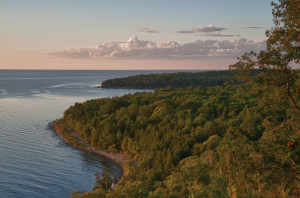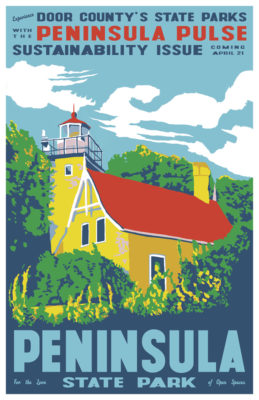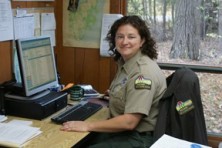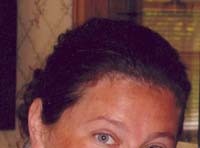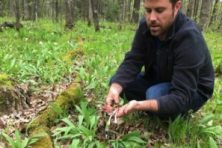Peninsula State Park’s New Superintendent, Kelli Bruns
- Share
- Tweet
- Pin
- Share

Kelli Bruns stepped into the top job at Peninsula State Park on September 1, 2011, filling the position that had been occupied by two interim superintendents since the retirement of longtime Superintendent Tom Blackwood at the end of 2009.
Bruns comes to Peninsula with a duel degree in forest recreation and forest management from UW Stevens Point. Since 2003 she has cut her teeth with stints at Kettle Moraine Northern Unit, Kohler-Andrae, and Willow River state parks.
I sat down with Bruns to chat about the challenges and benefits of working at one of Wisconsin’s favorite parks shortly after she settled into her new position.
Brittany Jordt (BJ): Your mom’s from Newfoundland, but you grew up and went to school in Wisconsin, correct?
Kelli Bruns (KB): I grew up with a lot of my summers in Canada. I loved spending time up in the North Atlantic. I’m a native of Wisconsin, though; I was born and raised in Sheboygan.
BJ: Would you say visiting the North Atlantic is where your passion for the outdoors began?
KB: That was definitely the start of my love for the outdoors. I knew I was going to go through my life with some kind of an understanding or commitment to providing stewardship to our resources. That’s how I went down the path of resource management. I’m very fond of outdoor recreation while preserving the resource. When I started working for the state park system, I felt like I really found my niche and it was where I belonged. I’ve always been a ‘park person.’ I feel like this is where I need to be, and where I do my best work.
BJ: What made you apply for the superintendent position at Peninsula State Park?
KB: I really missed this side of the state and have loved Door County and the peninsula for years and years. My husband and I had our first date at the Peninsula State Park Golf Course and were married up here in Sister Bay. We’re thrilled and happy to be back here and ready to move Peninsula into the future.
BJ: So far, how does Peninsula differ from your other experiences?
KB: Peninsula’s unique because we have a lot of different amenities here that some other state parks don’t have: the golf course, the lighthouse, and American Folklore Theatre [AFT]. They are definitely above and beyond what you would see in a normal state park setting, but they fit – they’ve been here for years and they’re great entities.
BJ: What are your expectations working as the superintendent at such a busy park?
KB: It’s one of our most beloved parks in the system, so there’s definitely been discussions on how we can preserve the resource and still meet the high expectations for people who come in for recreation. With a lower operating budget we’ve got to do some problem solving to provide that high caliber service to the public.
BJ: Our little towns are so dependent on having people coming to recreate in the park and then going to shop or eat at our local businesses.
KB: Absolutely. We want to continue to bring visitors and support the economy in the Door County area. That’s really important for all the state parks. The resource is the reason that we’re here, and the reason that people come here. What can we do to make sure we’re taking a good look at preserving the park for future generations? That’s really my main charge.
BJ: What are some things you’ve learned so far about the way the park operates?
KB: Any time you shift from one park to the next there’s always a learning process about how things are done. I was able to see the last AFT show before the season ended, which was something I’d never done. I got a feel for how important that niche is. I went over to the Eagle Bluff Lighthouse, to see how that’s running. I’m just really trying to get to know the park and the property, and how all the different functions work together.
BJ: Peninsula State Park has a history that’s deeply rooted in the culture of Door County. How does that compare to other parks?
KB: A lot of the properties that I’ve been at have history, but the history of Peninsula State Park is so incredible – when you look at the people who lived here, grew up here, farmed and fished here. All of these different uses that took place so many years ago. It has so much value.
BJ: How does your background working with support groups and community organizations help you at Peninsula?
KB: We’re lucky because the Friends of Peninsula State Park have been established for a little over four years. They’ve been very instrumental in raising funds, building facilities and volunteering their labor. Those types of things that our operating budget can’t cover, they’ve really helped with, and they do a lot of hands-on work as well. Without them we would definitely see a void in those niches or opportunities that we can provide to the public.
BJ: On the evening of the September 29, 2011 windstorm [that broke 75 power poles and left nearly 13,000 people along the peninsula without power, including the park], what kind of preparations were taken to ready yourselves for the worst-case scenario?
KB: We had a meeting that afternoon to make sure our chain saws and tractors were fueled up and ready to go. We also have an Emergency Action Plan for notifying the campers and making sure people are safe.
BJ: When did you know that this wasn’t going to be an “ordinary” storm?
KB: Between 8:00 and 9:00 pm the wind started to blow much harder, and then at 9:00 pm we lost power. We only had one other ranger on duty that night. I left home and went to the office to make sure the staffers still working in there were safe and to help them leave. Trees were falling everywhere, a lot of them at the park entrance. But we really saw what we were up against when we started to get into the campgrounds. Many people were trying to leave but found their way blocked with fallen trees. We were using the tractor to clear as many off the road as possible.
BJ: Wow. That had to be a scary situation.
KB: It got to be very dangerous around 1:00 or 2:00 am, when the winds were at their max, probably 60 or 70 miles per hour. We decided it was best to stop for the night. When we got started again early the next morning we realized it was countywide. Our department required that we close the park and assess the damage. The hardest part was that it took so long to get our power back. We couldn’t let the public in without bathrooms or running water.
BJ: After successfully managing the windstorm and being part of such a large, collective effort to get things cleaned up, you must feel like you’ve been through a sort of initiation.
KB: It was definitely an interesting start. It allowed me to get very orientated with all the trail systems and the roads. It was a huge team effort. It’s easy to coordinate when you have great people on your team and everyone can take an assignment and make it happen. I am very happy and impressed with our staff and all the volunteers. Everyone stepped in and helped. We survived, learned a lot, and we were happy to get the park back open for people to use.
BJ: It seems like everyone who works at Peninsula State Park feels really passionately about what a special park we have with its eight miles of shoreline and the incredible bluffs…that must help make your job a little easier?
KB: It always comes back to the fact that this property is so worth it – every day that you work, every hour as a volunteer, every board that you’re serving on or committee you’re working on. Most of the people that I’ve met, as well as myself, realize that everything you can do to continue the mission of Peninsula is well worth it.

